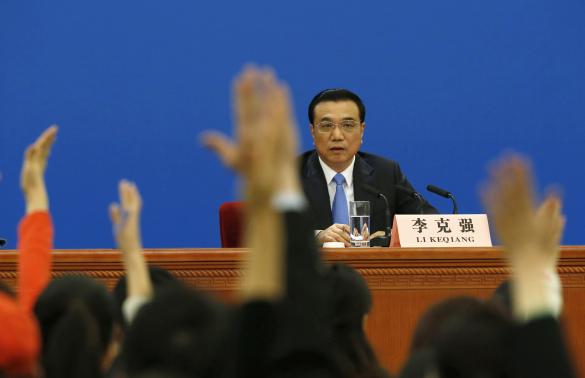
Reporters raise hands during China's Premier Li Keqiang's annual news conference following the closing session of the National People's Congress (NPC), or Parliament, at the Great Hall of the People in Beijing March 15, 2015.
CREDIT: REUTERS/KIM KYUNG-HOON
(Reuters) - China has a lot of room to maneuver its policy and boost its economy having avoided using strong, short-term stimulus in recent years, Premier Li Keqiang said on Sunday, in a rare suggestion that authorities can do much more to stoke growth.
Li, addressing a news conference at the end of China's annual session of parliament, tried to allay fears about a stumbling economy by vowing to keep it growing at a reasonable speed, even as he acknowledged the job is not easy.
He assured his audience that policymakers would prop up the economy if growth was at risk of breaching a lower limit, or hurt employment and income gains.
In recent years, we have not taken any strong, short-term stimulus policies, so we can say our room for policy maneuver is relatively big, the tools in our toolbox comparatively many, Li said.
If the slowdown in growth affects employment and incomes, and approaches the lower-limit of a reasonable range, we will stabilize policies and the market's long-term expectations for China, he said at a two-hour briefing.
And at the same time, (we will) increase the intensity of targeted (policy) control, he said.
Turning to his government's plans to deliver economic growth of around 7 percent this year, Li said: It looks like economic growth has been adjusted lower, but in reality achieving this target will not be easy.
A 7 percent growth target is China's lowest in 11 years, and would mark the slowest expansion in a quarter of a century if it came to pass.
He said it was a challenge for the government to deliver economic growth of about 7 percent this year because the economy was already worth more than $10 trillion.
However, Li reiterated that authorities would do what they could to keep growth within a reasonable range, and denied any assertion that China was exporting deflation.
A TRUMP CARD IN ENVIRONMENTAL LAW
Weighed by a property downturn, hefty debt burdens, and lethargic foreign and domestic demand, China's economy has struggled in the last 15 months or so, as growth in exports, investment, manufacturing and retail sales all waned.
That dented growth to a 24-year low of 7.4 percent last year, and analysts widely assume that the entrenched cool down would deepen this year.
When asked if he was worried about rising financial risks as the economy struggles, Li acknowledged the dangers but said China could prevent systemic risks from surfacing.
He said his government would minimize moral hazards by allowing flare-ups in financial risks on a case-by-case basis, but did not elaborate.
Many economists have criticized the government for its reluctance to let big state-owned or flagship private firms fail for fear of increasing unemployment. They say the government's willingness to support badly run businesses encourages waste and fuels credit danger.
Li did not address those concerns, but promised that his government would advance social, financial and economic reforms that are meant to be China's most ambitious in 30 years.
Reiterating earlier remarks this week by central bank governor Zhou Xiaochuan, Li said the government would unveil an insurance system for depositors this year.
At the same time, authorities will toughen their fight against pollution to clean up air, land and waterways by enforcing a new environmental law.
Companies that violate the law and regulation with their emissions, no matter what kind of businesses they are, they will be investigated according to law, and even let those businesses that secretly emit or discharge to pay a cost that they cannot afford to pay, Li said.
The environmental law is not a cotton swab, but the strongest trump card, he said.